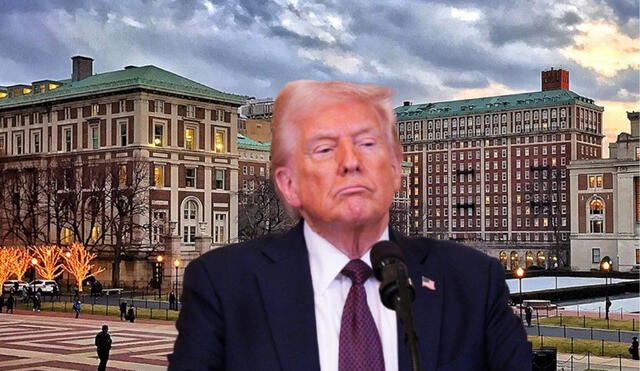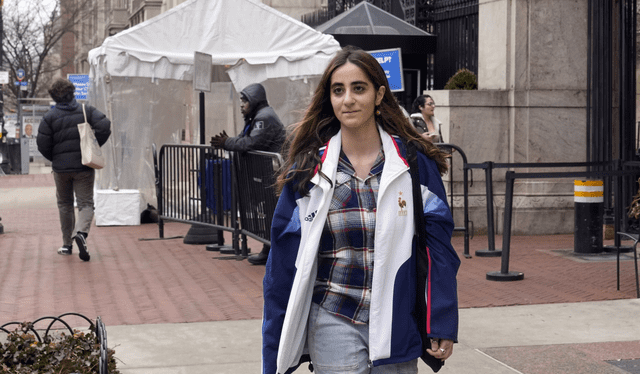Columbia University investigates students critical of Israel amid Trump’s threats
Columbia University is investigating students who have voiced criticism of Israel amid threats from President Trump. The investigation has sparked controversy and raised questions about free speech on campus.

Columbia University is facing increasing scrutiny after launching a series of investigations into students who have voiced criticism of Israel. Among the most notable cases is that of senior Maryam Alwan, who received an email accusing her of discriminatory harassment for writing an op-ed calling for the university to divest from Israel. The university's new disciplinary office, the Office of Institutional Equity, has been at the center of a growing number of such investigations, raising concerns over free speech and academic freedom.
The investigations have expanded beyond op-eds, with students being targeted for supporting Palestinian rights on social media, participating in protests, and even organizing art exhibitions. These cases are sparking widespread concern over whether the university is suppressing political expression, particularly in response to pressure from external political figures, including President Donald Trump.

ALSO SEE: Former U.S. Army soldiers charged in scheme to sell sensitive military information to China
Disciplinary investigations and criticism of Israel
Maryam Alwan’s op-ed in The Columbia Spectator called for divestment from Israel and challenged the university’s academic ties with the country. The university’s disciplinary committee claimed that her statements might have subjected other students to "unwelcome conduct" based on their religion, national origin, or military service, with consequences ranging from warnings to expulsion. Alwan, who is Palestinian-American, expressed that the accusations against her were an infringement on her right to free speech, especially as her article underwent rigorous edits before publication.

Maryam Alwan received an email accusing her of discriminatory harassment for writing an op-ed calling for the university to divest from Israel. Photo: AP News
This is not an isolated case. In recent weeks, the university’s disciplinary committee has sent notices to dozens of students for various activities, including participating in unauthorized protests or supporting Palestinian causes on social media. One such case involved a student accused of putting up "Wanted" posters targeting university trustees off-campus, and another was investigated for co-hosting an art exhibition related to a protest that occurred last spring.
Columbia’s financial pressure and allegations of political influence
The investigations have raised concerns that Columbia University is bowing to political pressure from the federal government, particularly with the Trump administration threatening to cut funding if the university fails to address harassment of Jewish students. Recently, federal agencies suggested withholding $51 million in contracts and additional grants due to what they called "ongoing inaction" in addressing allegations of harassment faced by Jewish students. The situation is further complicated by pressure from Republican lawmakers, who have demanded access to student disciplinary records in connection with protests that they claim "promoted terrorism."
In response, Columbia University reiterated its commitment to ensuring a safe environment for all students, stating, “We are resolute that calling for, promoting, or glorifying violence or terror has no place at our university.” However, critics argue that the university’s actions are driven by a desire to protect its financial interests rather than uphold the rights of its students.
A secretive and controversial process
One of the most alarming aspects of the disciplinary process is its secrecy. Students under investigation are required to sign nondisclosure agreements before accessing case materials or speaking to investigators. This has created an atmosphere of uncertainty and fear, with some students reporting that they were accused of participating in events they were not involved in, or even posting messages on social media that they did not share.
Some students, like Mahmoud Khalil, a graduate student who served as a negotiator for pro-Palestinian protesters, claims to have been falsely implicated in misconduct. After refusing to sign the nondisclosure agreement, Khalil’s graduation was temporarily blocked until he appealed the decision. Khalil argues that the university is using these investigations as a political tool to appease government pressures and "chill pro-Palestine speech" on campus.
Growing tensions on campus
The investigations have only intensified tensions between pro-Palestinian activists and Jewish students at Columbia. While some Jewish students have criticized the rhetoric of pro-Palestinian protests as antisemitic, others have voiced concerns that the university's handling of these investigations undermines free speech and political expression. In response to the disciplinary actions, student activism has surged, with protests and occupations continuing across campus. Recently, students at Barnard College, an affiliate of Columbia, staged a protest in response to the expulsion of two students involved in a protest against an Israeli history class.












